With QE2 winding down in 2 months and no QE3 on the horizon, we can finally turn around and look at the policies of other nations, as the tidal wave of new dollars pulls back and exposes their own, smaller, montetary schemes. The rest of the World is crying Uncle Sam as most Central Banks are mandated to fight inflation and that has been an impossible dream while the US runs the money spigots. Even worse, relatively lower US lending rates sets up a new global carry trade, threatening to make the US the new Japan as Dollars are sold (devalued) Globally and high-yield currencies are bought, making the Dollar relatively weaker and crippling trade for other nations as well as devaluing their Dollar-denominated assets (including debt notes!). It was bad enough when Japan did it and the Yen is less than 10% of all Global currency – the Dollar is 62%.
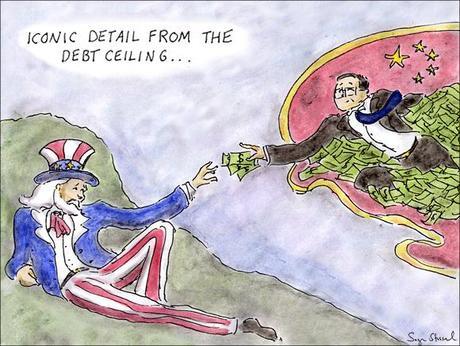
The flood of Dollars around the World has already led the IMF to take the fairly drastic step of endorsing capital controls. This marked a reversal in its longstanding opposition to limits on the free flow of capital around the World. IMF officials have come to acknowledge emerging markets’ need to curb surging inflows, which can fuel asset bubbles and inflation and hurt domestic exporters by driving currency values higher. The IMF’s plan would have encouraged nations to treat capital controls as a last resort, after they had first tried use other tools, such as policies on interest rates, currency values and government budgets. But ministers of developing economies resisted vehemently, viewing the proposal as an effort by advanced economies to hamstring their policies. Brazil, Turkey, South Korea and several other developing countries have adopted capital controls over the past year to limit surging inflows.
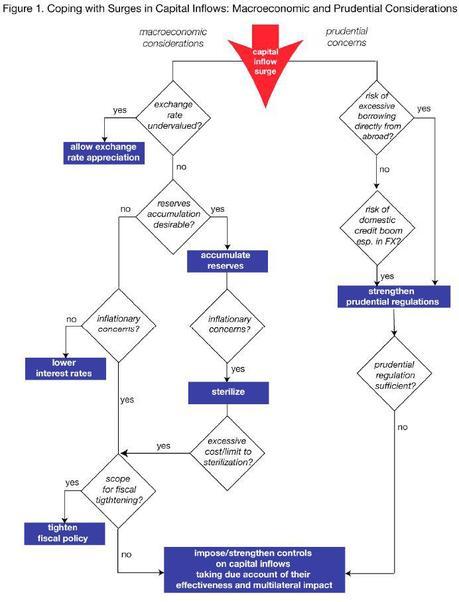
Mr. Mantega called capital controls "self-defense" measures. "Ironically, some of the countries that are responsible for the deepest crisis since the Great Depression, and have yet to solve their own problems, are eager to prescribe codes of conduct to the rest of the world, including to countries that are overburdened by the spillover effects of the policies adopted by them," he said in a statement to the policy committee.
Brazil’s economy is a great example of how US policy drives other nations to ruin as their government attempts to hold down inflation by raising interest rates but then those high rates attract hot money flows from around the World and pushes up the value of the Real. Brazil’s Central Bank attempts to modify this effect by buying Dollars – forced to spend 1.4% of their GDP on this operation in 2010 alone – this is how the US strong-arms emerging markets into buying our debt!
China is doing what they can with yet another round of tightening this morning and central bank Governor Zhou Xiaochuan said monetary tightening will continue for “some time.” Reserve ratios will rise a half point from April 21, the People’s Bank of China said on its website yesterday, pushing the requirement to a record 20.5 percent for the biggest lenders. The move came less than two weeks after an interest-rate increase. The nation’s fifth interest-rate increase since the financial crisis may come as soon as next month after inflation accelerated in March to the fastest pace since 2008. Chinese policy makers may also consider allowing faster appreciation in the yuan to reduce the cost of imported commodities.
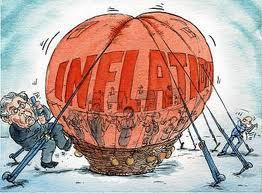
The Euro continues to fall against the Dollar (now $1.43) on speculation that Greece will be unable to avoid a default. The anti-Euro True Finns Party got 19% of the vote in this weekend’s elections and that will hinder regional efforts to assist ailing nations, including Portugal and Ireland. Greek bond yields surged to records. “The latest developments in the euro region have a potential to provide hurdles for the Euro,” said Jane Foley, a senior currency strategist at Rabobank International in London. “The situation in Finland has to be monitored very closely, because it’s reflecting a trend in the political landscape of the region. There’s clearly fear among voters that they have to pay for fiscal mistakes of others.”
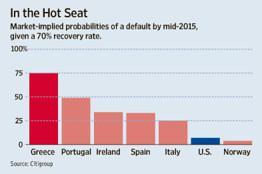
Euro-zone officials, including finance ministers, have said it is necessary to restructure Greece’s debt and the European Central Bank responded by saying it didn’t want a public discussion, an unidentified official familiar with the situation told WSJ. A first step would be to substantially extend Greek bond maturities, another unidentified official said, according to the paper. That may include extending debt repayments by as much as 30 years, the official said.
Greece’s central bank chief said Monday that a restructuring of the country’s giant public debt would have "disastrous consequences," and called on the government to step up the pace of its reform program. "[A debt restructuring] is neither necessary nor desirable," Bank of Greece governor George Provopoulos said. "It would have disastrous consequences for the access of the government and of Greek enterprises to international financial markets, as well as very negative effects on the assets of pension funds, banks and individuals holding Greek government securities."
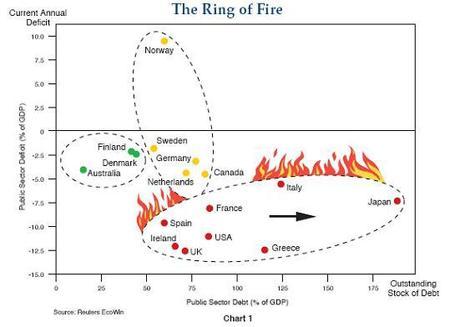
But many analysts say Greece’s fiscal reforms aren’t enough to tackle a debt burden expected to reach nearly 160% of GDP in 2013. In recent weeks, there has been growing speculation that Greece will need to proceed with some sort of debt restructuring to ease that burden. The central bank also sees inflation slowing to around 3.25% this year—down from an average rate of about 4.6% in 2010—but well above the government’s 2.2% forecast for 2011.
Early last year we discussed the "Ring of Fire" that represents the economies most likely to collapse under the weight of their debts. Greece was, and is, clearly in the worst shape since, unlike the US, Japan and the UK – they were unable to print their way out of trouble but nothing has really changed on this chart other than a massive increase in debt that has moved the entire ring one giant step to the right. I’m sorry if today’s discussion seems dull to some of you but this is how long this slow-motion collapse can be but, make no mistake about it, we are one by one being dragged over the cliff and it will quickly get worse if fiscally strong nations like Finland cut their ties to the debtor nations to avoid sharing their fate.
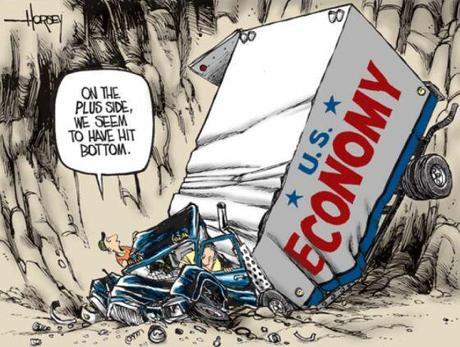
This will be interesting because that whacks the Dollar but is NOT good for the markets as rates rise (good for TBT) and is not good for oil or copper but is good for gold and silver and Japan will absolutely hate it too. This should be good for our EDZ hedge as well so happy, happy, joy, joy for our disaster hedges this morning. It may not be the disaster we expected but we’ll take it!
Keep in mind things like this don’t all happen at once, today just happens to be a day that the S&P happens to mention that we are standing dangerously close to the ledge. Brazil was much smaller than Greece when they defaulted in 1983 and they took the US economy down with them and Russia was forced to restructure their debt in February of 2000 and I don’t think I have to paint a chart of the Global markets that year to let you know how serious this can be.
But we’re clearly not talking about just Greece here. Most nations assume inflation will go down for the rest of the year while we at PSW have been pointing out that that is complete and utter BS. Higher inflation means all interest rate projections are complete BS and, should growth slow as well – then that entire ring of fire takes a giant step down AND to the right yet again.
World Bank President Robert Zoellick said the global economy is “one shock away” from a crisis in food supplies and prices. The United Nations FAO Food Price index jumped 25 percent last year, the second-steepest increase since at least 1991, and surged to a record in February. Food price inflation is “the biggest threat today to the world’s poor,” Zoellick said at a press conference following meetings of the World Bank and the International Monetary Fund. “We are one shock away from a full-blown crisis.”

